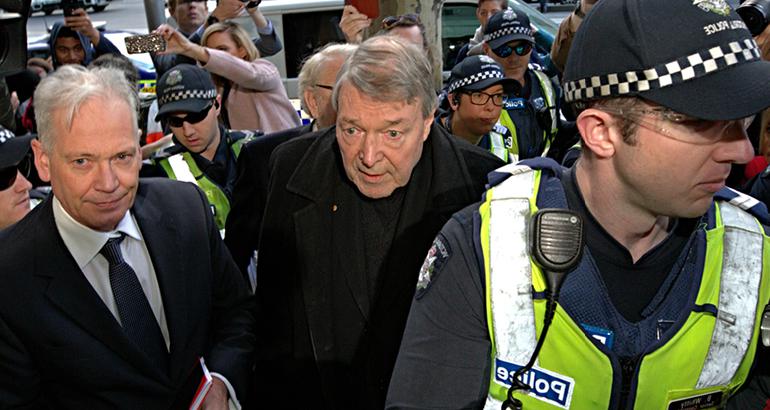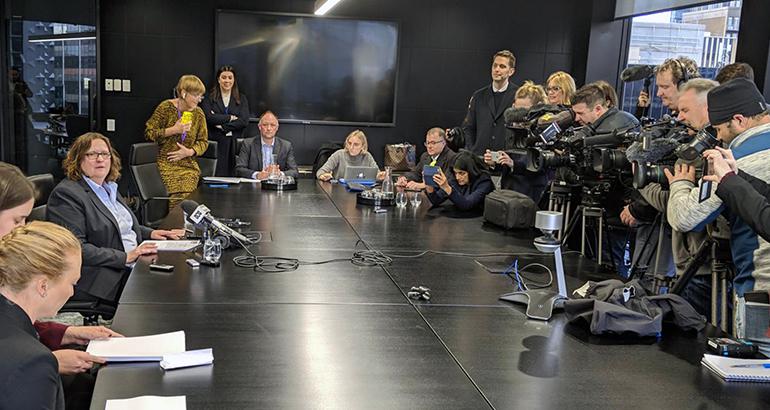|
Inside stories: Lawyers on the trials of the Pell case
By Karin Derkley
In a sexual abuse case that has polarised opinion, for the solicitors working on both sides it has been business as usual. When the High Court announced on 7 April that it would uphold Cardinal George Pell’s appeal against his County Court conviction for sexual abuse of two choirboys in the 1990s, it drew a line, for now, under years of work for the solicitors who have been intimately involved in the case. It has been a case that has polarised opinion, has had international notoriety and involved controversy on a number of levels. But while it has been hard to ignore its high profile nature, for those working on the case or advising those involved in it, it has been business as usual – working through the evidence and mustering the framework for the prosecution or the defence case, or dealing with the incredible public interest the case has attracted. Paul GalballyFor Cardinal Pell's instructing solicitors, Galbally & O'Bryan Lawyers, the case has occupied the firm for the best part of the past three years, with up to five lawyers working on the case at certain times. Partner Paul Galbally says he knew the matter would be a “very large and significant task. But we didn’t envisage there would be two lots of trials and that it would end up in the Full Court and then in the High Court.” The case involved a “voluminous” amount of material, with more evidentiary witnesses than most cases the firm has dealt with. “To stay on top of the evidence and to document exactly who said what when is a relentless task of detail and energy. It’s got to be an exact science,” he says. Mr Galbally singles out in particular the work of his senior associate Kartya Gracer, who worked “tirelessly, virtually for three years non-stop”, but praises the focus of the whole of the legal team, including counsel Robert Richter QC, Ruth Shann and later Bret Walker SC. “There has been a lot of support within the whole law firm to ensure the Pell team were getting the resources they needed.” Colleagues across the criminal law fraternity have also been generous in their encouragement over the years, he says. “They understand what the whole legal team is going through. They call you, text you, send emails and see you in court and wish you all the best.” Aware that many in the community had a view on the matter, Mr Galbally says his rule was not to discuss the matter outside of the legal framework. If the matter was ever brought up in social situations, he says, “the trick was just not to respond. Everyone’s entitled to their opinion, but you just listen and say that you’re not in a position to discuss it.” While mindful of the high profile of the case, he emphasises that all cases are equally important. “I think professionally you can never really put one case above another case because to every client their matter is critical to them, which is correct.” The case did however firm up his view that while juries are an important institution, some cases, such as this one, warrant the consideration of a judge-alone trial. “The pervasive nature of social media provides new and unique challenges to juries that did not exist even a decade ago. The legal system now requires an option in certain circumstances for an accused to elect to have their matter heard by judge alone.” Vivian WallerWhen the High Court announced it had upheld Cardinal Pell’s appeal, it fell to Vivian Waller to communicate the response of Witness J, the complainant who had reported the case to Victoria Police. Dr Waller, whose firm Waller Legal is dedicated to litigating for survivors of institutional sexual abuse, took on Witness J on a pro bono basis after Pell was convicted in the County Court. As a solicitor, Dr Waller has plenty of experience in dealing with civil claims for institutional child sexual abuse. But in this instance, she says, her role was not to provide Witness J with legal advice about the criminal case, but to serve as his spokesperson and as a buffer shielding him and his family from invasive public scrutiny following the lifting of the suppression orders after the conviction. “It was important to Witness J that his identity was protected, particularly given the extremely high profile nature of the case.” Part of her role was managing the hundreds of messages coming in to her firm about the case, in the form of emails, letters or messages left with reception, occasionally accompanied by gifts. “The overwhelming proportion were messages of goodwill and support, but there was also criticism and hate mail for both of us,” she says. The other side of her role was to deal with a media hungry for information about the case and her client. Following the County Court conviction, Dr Waller read out a statement by Witness J and made it clear that the media were not to contact her client directly. While she says it was reasonable for the media to have an interest in the case, the strategy to release a statement was so the media wouldn’t continue to pursue him for more public comment. “I made it known I was looking after him so that journalists had somewhere to direct their inquiries, which meant they weren’t trying to track him down individually,” she says. Dr Waller says that involved reminding reporters of their obligations under the Judicial Proceedings Reports Act in Australia, and that you cannot publish material that might identify a person who is, or who alleges to be, a victim of a sexual assault without their consent. “But I was going further by appealing to people’s better nature by asking them to respect Witness J’s wishes not to be contacted directly. It is not an easy thing to be a witness in a criminal case, having to give evidence about sexual offending, enduring cross-examination and attacks on your credibility – these are difficult things, especially in a high-profile case.” On the whole the Australian media has been very respectful of Witness J’s privacy and wishes, she says. “There’s always a small element who are not willing to respect the parameters, ignoring requests not to approach Witness J at his home and work. But thankfully everyone has complied with the law and not revealed his identity.” However, she is less complimentary about the more sensationalist and even “vitriolic” reporting of the case in some parts of the media, particularly when it involved attacks on the judiciary and the judicial process. “Analysis and critique is one thing. But a lot of criticism of the judicial officers by some parts of the pro Pell media was quite disgraceful, and there were allegations in some quarters that there was some sort of orchestrated campaign to get Pell – which is completely without foundation. “A lot of vitriol was poured into that space and the targets were not in a position to address criticism. It’s not as if Victoria Police, or the Office of Public Prosecutions, or individual magistrates or judges can freely address the public to dispel unwarranted attacks on the performance of their duties or the institutions of the legal system.” She worries about the consequences of those kinds of attacks on the administration of justice. “While I understand that the administration of justice cannot involve some sort of rear guard engagement with public opinion, I do wonder whether something needs to be done to educate the public about due process and to defend and protect the judicial system and those people working within it.” Of the final acquittal, Witness J in his public statement said he accepted the verdict but would hate to think that one consequence of the acquittal would be to discourage survivors of sexual abuse from reporting it to the police. “That’s my concern as well,” Dr Waller says. “It is very important for survivors, if they can, to come forward and report to the police.” Dr Waller continues to work on civil sexual abuse claims against institutions, including 260 against Catholic entities. Of those, 35 have been issued as Victorian Supreme Court proceedings, with many more to follow in the months ahead. That is unlikely to include Witness J, who has not instructed Dr Waller to commence civil litigation for compensation. “He is a gentle, thoughtful, insightful and wonderful person and it has been a matter of great importance to me that I have been able to look after him,” she says. “But I think our time of working together is at an end.”
|
.
Any original material on these pages is copyright © BishopAccountability.org 2004. Reproduce freely with attribution.

